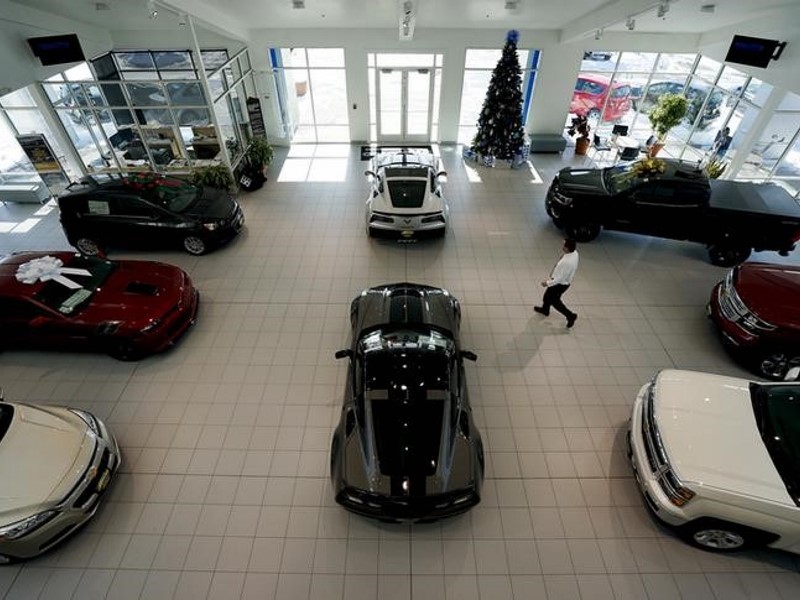- Home
- Others
- Others News
- US Unveils Automatic Emergency Braking Deal With Automakers
US Unveils Automatic Emergency Braking Deal With Automakers

The commitment by 20 automakers, representing more than 99 percent of the US auto market, will make the safety technology a standard feature on cars and light trucks no later than late 2022, the National Highway Traffic Safety Administration (NHTSA) said.
It will become standard on heavier trucks three years later.
Automatic emergency braking (AEB) systems help prevent crashes or diminish their severity by applying the brakes for the driver. Sensors including radar, cameras and lasers warn the driver of an impending crash, and the brakes engage when the driver fails to take sufficient and timely action to prevent it.
Automakers that agreed to the commitment are Audi, BMW, FCA US, Ford, General Motors, Honda, Hyundai, Jaguar Land Rover, Kia, Maserati, Mazda, Mercedes-Benz, Mitsubishi Motors, Nissan, Porsche, Subaru, Tesla Motors, Toyota, Volkswagen and Volvo Car USA.
"By proactively making emergency braking systems standard equipment on their vehicles, these 20 automakers will help prevent thousands of crashes and save lives,' said US Transportation Secretary Anthony Foxx in a statement.
"It's a win for safety and a win for consumers."
The head of the NHTSA, Mark Rosekind, sought to deflect criticism of the voluntary nature of the commitment, saying it would make AEB standard on new cars three years faster than a regulatory process.
According to the Insurance Institute for Highway Safety, the accelerated process will prevent some 28,000 crashes and 12,000 injuries.
"A commitment of this magnitude is unprecedented, and it will bring more safety to more Americans sooner," Rosekind said.
In January, a group of consumer advocates petitioned the NHTSA to seek a mandatory AEB standard rather than a corporate pledge.
The letter co-signed by Consumer Watchdog, the Center for Auto Safety and Joan Claybrook, former NHTSA administrator and now president emeritus of Public Citizen, said "Such 'self regulation' agreements are profoundly inferior to a regulation."
"They are developed behind closed doors, with no public involvement; are not binding on any company or particular vehicle or model at any given time and can be unilaterally (and secretly) abandoned," they wrote.
For the latest tech news and reviews, follow Gadgets 360 on X, Facebook, WhatsApp, Threads and Google News. For the latest videos on gadgets and tech, subscribe to our YouTube channel. If you want to know everything about top influencers, follow our in-house Who'sThat360 on Instagram and YouTube.
Related Stories
- Samsung Galaxy Unpacked 2025
- ChatGPT
- Redmi Note 14 Pro+
- iPhone 16
- Apple Vision Pro
- Oneplus 12
- OnePlus Nord CE 3 Lite 5G
- iPhone 13
- Xiaomi 14 Pro
- Oppo Find N3
- Tecno Spark Go (2023)
- Realme V30
- Best Phones Under 25000
- Samsung Galaxy S24 Series
- Cryptocurrency
- iQoo 12
- Samsung Galaxy S24 Ultra
- Giottus
- Samsung Galaxy Z Flip 5
- Apple 'Scary Fast'
- Housefull 5
- GoPro Hero 12 Black Review
- Invincible Season 2
- JioGlass
- HD Ready TV
- Laptop Under 50000
- Smartwatch Under 10000
- Latest Mobile Phones
- Compare Phones
- Infinix Smart 9 HD
- Lava Yuva Smart
- Samsung Galaxy S25 Ultra
- Samsung Galaxy S25+
- Samsung Galaxy S25
- Realme 14 Pro 5G
- Realme 14 Pro+ 5G
- Itel Zeno 10
- Asus Chromebook CR11
- Lenovo Yoga Slim 9i (2025)
- Asus ROG Flow Z13 (2025)
- Xiaomi Pad 7
- Titan Evolution
- Noise ColorFit Pro 6
- Sony 65 Inches Ultra HD (4K) LED Smart TV (KD-65X74L)
- TCL 55 Inches Ultra HD (4K) LED Smart TV (55C61B)
- Sony PlayStation 5 Pro
- Sony PlayStation 5 Slim Digital Edition
- Blue Star 1.5 Ton 3 Star Inverter Split AC (IC318DNUHC)
- Blue Star 1.5 Ton 3 Star Inverter Split AC (IA318VKU)
















